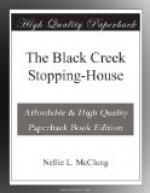“You put it so aptly, my dear,” Mrs. Trenton smiled, as she patted her pearl bracelet, Mr. Trenton’s last offering on the hymeneal altar. “It requires—” she paused again—Mrs. Trenton’s pauses were a very important asset in her conversation—“it requires—”
“Collateral,” said Mrs. Banks.
Miss Hastings shook her head.
“I believe in marriage—all the same,” she said heroically.
“Now, how shall we do it?” Mrs. Banks was anxious to get the preliminaries over. “You have decided to invite her, of course.”
Mrs. Trenton nodded.
“I feel we have no choice in the matter,” she said slowly. “She is certainly a woman of artistic temperament—she must be, or she would succumb to the dreary prairie level. I have followed her career with interest and predict great things for her—have I not, Miss Hastings? We should not blame her if in a moment of girlish romance she turned her back on the life which now is. We, as officers of the Arts and Crafts, must extend our fellowship to all who are worthy. This joining of our ranks may show her what she lost by her girlish folly, but it is better for her to know life, and even feel regrets, than never to know.”
“Better have a scarlet thread run through the dull gray pattern of life, even if it makes the gray all the duller,” said Miss Hastings, who worked in oils.
And so it came about that an invitation was sent to Mrs. James Dawson, Auburn, Alberta, and in due time an acceptance was received.
From the time she alighted from the Pacific Express, a slight young woman in a very smart linen suit, she was a constant surprise to the Arts and Crafts. The principal cause of their surprise was that she seemed perfectly happy. There was not a shadow of regret in her clear grey eyes, nor any trace of drooping melancholy in her quick, business-like walk.
Naturally the Arts and Crafts had made quite a feature of the Alberta author and poet who would attend the Convention. Several of the enthusiastic members, anxious to advertise effectively, had interviewed the newspaper reporters on the subject, with the result that long articles were published in the Woman’s Section of the city dailies, dealing principally with the loneliness of the life on an Alberta ranch. Kate Dawson was credited with an heroic spirit that would have made her blush had she seen the flattering allusions. Robinson Crusoe on his lonely isle, before the advent of Friday, was not more isolated than she on her lonely Alberta ranch, according to the advance notices. Luckily she had not seen any of these, nor ever dreamed she was the centre of so much attention, and so it was a very self-possessed and unconscious young woman in a simple white gown who came before the Arts and Crafts.
It was the first open night of the Convention, and the auditorium was crowded. The air was heavy with the perfume of many flowers, and pulsed with dreamy music. Mrs. Trenton, in billows of black lace and glinting jet, presided with her usual graciousness. She introduced Mrs. Dawson briefly.




